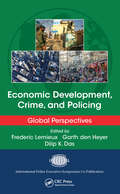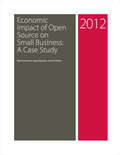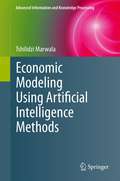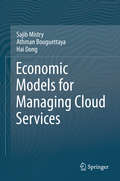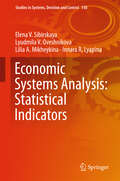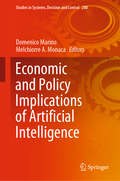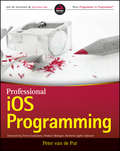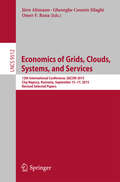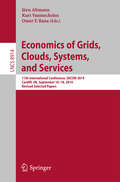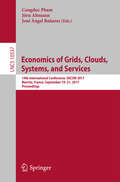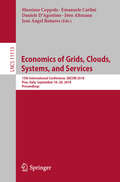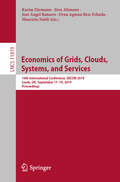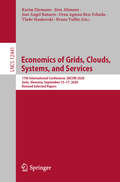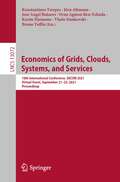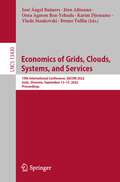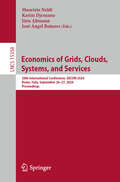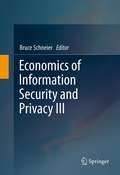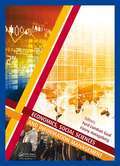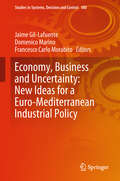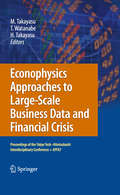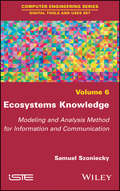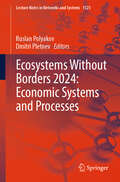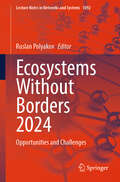- Table View
- List View
Economic Development, Crime, and Policing: Global Perspectives (International Police Executive Symposium Co-Publications)
by Dilip K. Das Frederic Lemieux Garth Den HeyerThe 22nd Annual Meeting of the International Police Executive Symposium was held in August 2012 at the United Nations Plaza in New York. Chaired by Dr. Garth den Heyer, the symposium focused on the links between economic development, armed violence, and public safety. Drawn from these proceedings, Economic Development, Crime, and Policing: Global P
Economic Impact of Open Source on Small Business: A Case Study
by Tim O'Reilly Mike Hendrickson Roger MagoulasOpen source is not only a catalyst for small business growth, but also a driver of future success for many startups today. Bringing together Bluehost anonymized customer data and trends with O’Reilly Media’s job market data, along with other sources of trend data, this report captures the current state of open source as it relates to small to medium-sized businesses.
Economic Modeling Using Artificial Intelligence Methods
by Tshilidzi MarwalaEconomic Modeling Using Artificial Intelligence Methods examines the application of artificial intelligence methods to model economic data. Traditionally, economic modeling has been modeled in the linear domain where the principles of superposition are valid. The application of artificial intelligence for economic modeling allows for a flexible multi-order non-linear modeling. In addition, game theory has largely been applied in economic modeling. However, the inherent limitation of game theory when dealing with many player games encourages the use of multi-agent systems for modeling economic phenomena. The artificial intelligence techniques used to model economic data include: multi-layer perceptron neural networksradial basis functionssupport vector machinesrough setsgenetic algorithmparticle swarm optimizationsimulated annealingmulti-agent systemincremental learningfuzzy networksSignal processing techniques are explored to analyze economic data, and these techniques are the time domain methods, time-frequency domain methods and fractals dimension approaches. Interesting economic problems such as causality versus correlation, simulating the stock market, modeling and controling inflation, option pricing, modeling economic growth as well as portfolio optimization are examined. The relationship between economic dependency and interstate conflict is explored, and knowledge on how economics is useful to foster peace - and vice versa - is investigated. Economic Modeling Using Artificial Intelligence Methods deals with the issue of causality in the non-linear domain and applies the automatic relevance determination, the evidence framework, Bayesian approach and Granger causality to understand causality and correlation. Economic Modeling Using Artificial Intelligence Methods makes an important contribution to the area of econometrics, and is a valuable source of reference for graduate students, researchers and financial practitioners.
Economic Models for Managing Cloud Services
by Athman Bouguettaya Sajib Mistry Hai DongThe authors introduce both the quantitative and qualitative economic models as optimization tools for the selection of long-term cloud service requests. The economic models fit almost intuitively in the way business is usually done and maximize the profit of a cloud provider for a long-term period. The authors propose a new multivariate Hidden Markov and Autoregressive Integrated Moving Average (HMM-ARIMA) model to predict various patterns of runtime resource utilization. A heuristic-based Integer Linear Programming (ILP) optimization approach is developed to maximize the runtime resource utilization. It deploys a Dynamic Bayesian Network (DBN) to model the dynamic pricing and long-term operating cost. A new Hybrid Adaptive Genetic Algorithm (HAGA) is proposed that optimizes a non-linear profit function periodically to address the stochastic arrival of requests. Next, the authors explore the Temporal Conditional Preference Network (TempCP-Net) as the qualitative economic model to represent the high-level IaaS business strategies. The temporal qualitative preferences are indexed in a multidimensional k-d tree to efficiently compute the preference ranking at runtime. A three-dimensional Q-learning approach is developed to find an optimal qualitative composition using statistical analysis on historical request patterns. Finally, the authors propose a new multivariate approach to predict future Quality of Service (QoS) performances of peer service providers to efficiently configure a TempCP-Net. It discusses the experimental results and evaluates the efficiency of the proposed composition framework using Google Cluster data, real-world QoS data, and synthetic data. It also explores the significance of the proposed approach in creating an economically viable and stable cloud market. This book can be utilized as a useful reference to anyone who is interested in theory, practice, and application of economic models in cloud computing. This book will be an invaluable guide for small and medium entrepreneurs who have invested or plan to invest in cloud infrastructures and services. Overall, this book is suitable for a wide audience that includes students, researchers, and practitioners studying or working in service-oriented computing and cloud computing.
Economic Systems Analysis: Statistical Indicators (Studies in Systems, Decision and Control #158)
by Elena V. Sibirskaya Lyudmila V. Oveshnikova Lilia A. Mikheykina Innara R. LyapinaThis book explores a wide range of issues related to the methodology, organization, and technologies of analytical work, showing the potential of using analytical tools and statistical indicators for studying socio-economic processes, forecasting, organizing effective companies, and improving managerial decisions. At the level of “living knowledge” in the broad context, it describes the essence of analytical technologies and means of applying analytical and statistical work. The book is of interest to readers regardless of their specialization: scientific research, medicine, pedagogics, law, administrative work, or economic practice. Starting from the premise that readers are familiar with the theory of statistics, which has formulated the general methods and principles of establishing the quantitative characteristics of mass phenomena and processes, it describes the concepts, definitions, indicators and classifications of socio-economic statistics, taking into consideration the international standards and the present-day practice of statistics in Russia. Although concise, the book provides plenty of study material as well as questions at the end of each chapter It is particularly useful for those interested in self-study or remote education, as well as business leaders who are interested in gaining a scientific understanding of their financial and economic activities.
Economic and Policy Implications of Artificial Intelligence (Studies in Systems, Decision and Control #288)
by Domenico Marino Melchiorre A. MonacaThis book presents original research articles addressing various aspects of artificial intelligence as applied to economics, law, management and optimization. The topics discussed include economics, policies, finance, law, resource allocation strategies and information technology. Combining the input of contributing professors and researchers from Italian and international universities, the book will be of interest to students, researchers and practitioners, as well as members of the general public interested in the economic and policy implications of artificial intelligence.
Economics and Social Conflict: Evil Actions and Evil Social Institutions in Virtual Worlds
by Carl D. MildenbergerThis book brings to life the classic thought experiment of a natural state. Provides data on the economic aspects of social conflict of 400.000 people living in a virtual anarchy; showing evil actions and rules exist from an economic perspective. Non-instrumental violence has economic effects and inciting people to fight are not overcome in time.
Economics and the Environment
by Peter van de PutHands-on guidance for programming the next generation of iOS apps If you want to create advanced level iOS apps that get noticed in the App Store, start with this expert book. Written by an international software developer and consultant who has delivered winning solutions for clients all over the world, this professional guide helps you build robust, professional iOS apps at a level that satisfies the demands of clients, companies, and your own creativity. The book includes full source code and invaluable insight from the author's extensive experience. Especially helpful are numerous case studies that shed light on key topics. Explores all topics necessary to help you build professional iOS applications perfectly targeted to clients' needs Covers essential topics including creating a professional UI, networking and data processing, integrating your app, and taking it into production Includes sample code and sample apps, ideal for hands-on learning Examines using social media aggregators, real-time currency converters, QR scanners, customer tracking and quality payment system Provides in-depth examples from the author's extensive career, as well as numerous case studies Take your programming skills to an advanced level with Professional iOS Programming.
Economics of Grids, Clouds, Systems, and Services
by Jörn Altmann Omer F. Rana Gheorghe Cosmin SilaghiThis book constitutes the refereed proceedings of the 12th International Conference on Economics of Grids, Clouds, Systems, and Services, GECON 2015, held in Cluj-Napoca, Romania, in September 2015. The 11 revised full papers and 10 paper-in-progress presented were carefully reviewed and selected from 38 submissions. The presentation sessions that have been set up are: resource allocation, service selection in clouds, energy conservation and smart grids, applications: tools and protocols, community networks and legal and socio-economic aspects.
Economics of Grids, Clouds, Systems, and Services
by Jörn Altmann Kurt Vanmechelen Omer F. RanaThis book constitutes the refereed proceedings of the 11th International Conference on Economics of Grids, Clouds, Systems, and Services, GECON 2014, held in Cardiff, UK, in September 2014. The 8 revised full papers and 7 paper-in-progress presented were carefully reviewed and selected from 24 submissions. The presentation sessions that have been set up are: Cloud Adoption, Work in Progress on Market Dynamics, Cost Optimization, Work in Progress on Pricing, Contracts and Service Selection and Economic Aspects of Quality of Service.
Economics of Grids, Clouds, Systems, and Services: 14th International Conference, GECON 2017, Biarritz, France, September 19-21, 2017, Proceedings (Lecture Notes in Computer Science #10537)
by Jörn Altmann José Ángel Bañares Congduc PhamThis book constitutes the refereed proceedings of the 14th International Conference on Economics of Grids, Clouds, Systems, and Services, GECON 2017, held in Biarritz, France, in September 2017.The 10 full papers and 10 short papers presented together with 3 invited talks were carefully reviewed and selected from 38 submissions.This volume of the GECON 2017 proceedings has been structured in sections following the sessions that comprised the conference program:Pricing in Cloud and Quality of Service, Work in Progress on Service Management, Work in Progress on Business models and Community Cooperation, Work in Progress on Energy Efficiency and Resource Management, Resource Management, Edge Computing, Cloud Federation; and Work in Progress on Service Selection and Coordination.
Economics of Grids, Clouds, Systems, and Services: 15th International Conference, GECON 2018, Pisa, Italy, September 18–20, 2018, Proceedings (Lecture Notes in Computer Science #11113)
by Jörn Altmann José Ángel Bañares Massimo Coppola Emanuele Carlini Daniele D’AgostinoThis book constitutes the refereed proceedings of the 15th International Conference on Economics of Grids, Clouds, Systems, and Services, GECON 2018, held in Pisa, Italy, in September 2018. The 21 full papers and 9 short papers presented together with 1 invited talk were carefully reviewed and selected from 40 submissions.This GECON 2018 proceedings was structured in three special sessions on selected topics, namely: IT service ecosystems enabled through emerging digital technologies; machine learning, cognitive systems and data science for system management; and blockchain technologies and economics.
Economics of Grids, Clouds, Systems, and Services: 16th International Conference, GECON 2019, Leeds, UK, September 17–19, 2019, Proceedings (Lecture Notes in Computer Science #11819)
by Jörn Altmann José Ángel Bañares Maurizio Naldi Karim Djemame Orna Agmon Ben-YehudaThis book constitutes the refereed proceedings of the 16th International Conference on Economics of Grids, Clouds, Systems, and Services, GECON 2019, held in Leeds, UK, in September 2019. The 12 full papers and 10 short papers presented in this book were carefully reviewed and selected from 48 submissions. This GECON 2019 proceedings was structured in selected topics, namely: blockchain technology and smart contracts; cost-based computing allocation; resource, service and communication federations; economic assessment, business and pricing models; blockchain and network function virtualization technologies; economic models for cyber-physical systems, industry 4.0 and sustainable systems; resource management; and emerging ideas.
Economics of Grids, Clouds, Systems, and Services: 17th International Conference, GECON 2020, Izola, Slovenia, September 15–17, 2020, Revised Selected Papers (Lecture Notes in Computer Science #12441)
by Jörn Altmann José Ángel Bañares Karim Djemame Bruno Tuffin Orna Agmon Ben-Yehuda Vlado StankovskiThis book constitutes the refereed proceedings of the 17th International Conference on Economics of Grids, Clouds, Systems, and Services, GECON 2020, held in Izola, Slovenia, in September 2020. Due to COVID-19 pandemic the conference was held virtually by the University of Ljubljana. The 11 full papers and 9 short papers presented in this book were carefully reviewed and selected from 40 submissions. The papers are structured in selected topics, namely: Smartness in Distributed Systems; Decentralizing Clouds to Deliver Intelligence at the Edge; Digital Infrastructures for Pandemic Response and Countermeasures; Dependability and Sustainability; Economic Computing and Storage; Poster Session.
Economics of Grids, Clouds, Systems, and Services: 18th International Conference, GECON 2021, Virtual Event, September 21–23, 2021, Proceedings (Lecture Notes in Computer Science #13072)
by Jörn Altmann José Ángel Bañares Konstantinos Tserpes Karim Djemame Bruno Tuffin Orna Agmon Ben-Yehuda Vlado StankovskiThis book constitutes the refereed proceedings of the 18th International Conference on Economics of Grids, Clouds, Systems, and Services, GECON 2021, in September 2021. Due to COVID-19 pandemic the conference was held virtually hosted by the Libera Università Maria SS. Assunta (LUMSA), Rome, Italy. The 7 full papers and 2 short papers presented in this book were carefully reviewed and selected from 41 submissions. In addition, this book includes 8 work-in-progress papers and 2 extended abstracts. Chapters “AI Technologies and Motives for AI Adoption by Countries and Firms: A Systematic Literature Review”; “Knowledge Management Framework for Cloud Federation”; “Architecture for Orchestrating Containers in Cloud” and “Towards Software Compliance Specification and Enforcement using TOSCA” are available open access under a Creative Commons Attribution 4.0 International License via link.springer.com.
Economics of Grids, Clouds, Systems, and Services: 19th International Conference, GECON 2022, Izola, Slovenia, September 13–15, 2022, Proceedings (Lecture Notes in Computer Science #13430)
by Jörn Altmann José Ángel Bañares Karim Djemame Bruno Tuffin Orna Agmon Ben-Yehuda Vlado StankovskiThis book constitutes the refereed proceedings of the 19th International Conference on Economics of Grids, Clouds, Systems, and Services, GECON 2022, held in Izola, Slovenia, in September 2022. The 4 full papers presented in this book were carefully reviewed and selected from 22 submissions. In addition, this book includes 6 work-in-progress papers, 4 new ideas paper, and two invited papers. This series of conferences serves as a meeting place to bring together distributed systems expertise (e.g., in resource allocation, quality of service management, and energy consumption) with economics expertise (focusing on both micro- and macro-economic modelling and analysis) for creating effective solutions in this space.
Economics of Grids, Clouds, Systems, and Services: 20th International Conference, GECON 2024, Rome, Italy, September 26–27, 2024, Proceedings (Lecture Notes in Computer Science #15358)
by José Ángel Bañares Maurizio Naldi Karim Djemame Jörn AltmannThis book constitutes the refereed proceedings of the 20th International Conference on Economics of Grids, Clouds, Systems, and Services, GECON 2024, held in Rome, Italy, during September 26–27, 2024. The 12 full papers and 10 short papers presented in this book were carefully reviewed and selected from 37 submissions. They focus on topics such as: Function as a Service: Resource Management and QoS; Cloud Business Models, Pricing, Trading, Network Neutrality; Edge Computing and Energy Awareness; AI/Forecasting/Prediction Sales; and Resource Management in Cloud Applications: Simulation, Streaming Processing and Workflows.
Economics of Information Security and Privacy III
by Bruce SchneierThe Workshop on the Economics of Information Security (WEIS) is the leading forum for interdisciplinary scholarship on information security, combining expertise from the fields of economics, social science, business, law, policy and computer science. Prior workshops have explored the role of incentives between attackers and defenders, identified market failures dogging Internet security, and assessed investments in cyber-defense. Current contributions build on past efforts using empirical and analytic tools to not only understand threats, but also strengthen security through novel evaluations of available solutions. Economics of Information Security and Privacy III addresses the following questions: how should information risk be modeled given the constraints of rare incidence and high interdependence; how do individuals' and organizations' perceptions of privacy and security color their decision making; how can we move towards a more secure information infrastructure and code base while accounting for the incentives of stakeholders?
Economics, Social Sciences and Information Management: Proceedings of the 2015 International Congress on Economics, Social Sciences and Information Management (ICESSIM 2015), 28-29 March 2015, Bali, Indonesia
by Ford Lumban Gaol Fonny HutagalungThe 2015 International Congress on Economics, Social Sciences and Information Management (ICESSIM 2015), held 28-29 March 2015 in Bali, Indonesia, aimed to provide a platform for the sharing of valuable knowledge and experience in the context of changing economics and social settings. Information technology has changed many aspects in our life, inc
Economy, Business and Uncertainty: New Ideas for a Euro-Mediterranean Industrial Policy (Studies in Systems, Decision and Control #180)
by Jaime Gil-Lafuente Francesco Carlo Morabito Domenico MarinoThis book presents original research articles addressing various aspects of economics, management and optimization. The topics discussed include economics, finance, marketing, resource allocation strategies, fuzzy logic, and network-based techniques for the analysis of economics, management and mathematical optimization.Combining the input of contributing professors and researchers from various Spanish, Italian and Latin American universities, the book will be of interest to students, researchers and practitioners, as well as members of the general public interested in the world of Economics and Management.
Econophysics Approaches to Large-Scale Business Data and Financial Crisis: Proceedings of Tokyo Tech-Hitotsubashi Interdisciplinary Conference + APFA7
by Tsutomu Watanabe Hideki Takayasu Misako TakayasuThe new science of econophysics has arisen out of the information age. As large-scale economic data are being increasingly generated by industries and enterprises worldwide, researchers from fields such as physics, mathematics, and information sciences are becoming involved. The vast number of transactions taking place, both in the financial markets and in the retail sector, is usually studied by economists and management and now by econophysicists. Using cutting-edge tools of computational analysis while searching for regularities and "laws" such as those found in the natural sciences, econophysicists have come up with intriguing results. The ultimate aim is to establish fundamental data collection and analysis techniques that embrace the expertise of a variety of academic disciplines. This book comprises selected papers from the international conference on novel analytical approaches to economic data held in Tokyo in March 2009. The papers include detailed reports on the market behavior during the financial crisis of 2008 and discussions on the mechanism of bubbles and crashes, with proposals for avoiding new crises. Filled with up-to-date research, this book will interest researchers and students, finance professionals, and scholars in diverse fields.
Ecosystems Knowledge: Modeling and Analysis Method for Information and Communication
by Samuel SzonieckyTo analyze complex situations we use everyday analogies that allow us to invest in an unknown domain knowledge we have acquired in a known field. In this work the author proposes a modeling and analysis method that uses the analogy of the ecosystem to embrace the complexity of an area of knowledge. After a history of the ecosystem concept and these derivatives (nature, ecology, environment ) from antiquity to the present, the analysis method based on the modeling of socio-semantic ontologies is presented, followed by practical examples of this approach in the areas of software development, digital humanities, Big Data, and more generally in the area of complex analysis.
Ecosystems Without Borders 2024: Economic Systems and Processes (Lecture Notes in Networks and Systems #1521)
by Ruslan Polyakov Dmitri PletnevThis book presents selected papers from the V International Scientific and Practical Conference &“Ecosystems without Borders&” held at Kaliningrad State Technical University, Kaliningrad, Russia, October 2–3, 2024. Materials of the book &“Ecosystems without Borders: Economic Systems and Processes&” include theoretical and spatial aspects of ecosystems, peculiarities of formation of the creative class in these conditions, as well as studies reflecting the transformation of ecosystems, both in innovative development and in science, technology and business. This book includes articles reflecting the latest scientific trends aimed at realizing the ideas of sustainable development and circular economy. This book is of interest to a wide range of readers, practicing economists, students, graduate students, and researchers, as well as government officials and managers of companies.
Ecosystems Without Borders 2024: Opportunities and Challenges (Lecture Notes in Networks and Systems #1092)
by Ruslan PolyakovThis book is a continuation of a series of presentations given at the III International Conference "Ecosystems Without Borders: Opportunities and Challenges" held at the Kaliningrad State Technical University in September 2023. The book presents research reflecting the transformation of ecosystems in the context of innovative development, science, technology and business. It also considers spatial aspects of ecosystems and the peculiarities of the formation of the creative class in the context of ecosystems. Theoretical articles aimed not only at the realization of the ideas of sustainable development in the economy but also at the realization of the ideas of structural transformation of innovation processes. The book is useful to a wide range of readers: practicing economists, students, graduate students and researchers, as well as government officials and company managers. The authors are confident that this book will serve as an important source of information and knowledge that will contribute to scientific and innovative progress in the field of sustainable development of society.
Ecstatic Worlds: Media, Utopias, Ecologies (Leonardo)
by Janine MarchessaultWhen media translate the world to the world: twentieth-century utopian projects including Edward Steichen's “Family of Man,” Jacques Cousteau's underwater films, and Buckminster Fuller's geoscope.janine
